German singer Cornelia 'Conny' Froboess (1943) was an immensely popular teen idol in the late 1950s and early 1960s. In the 1970s she transformed into a respected stage actress.
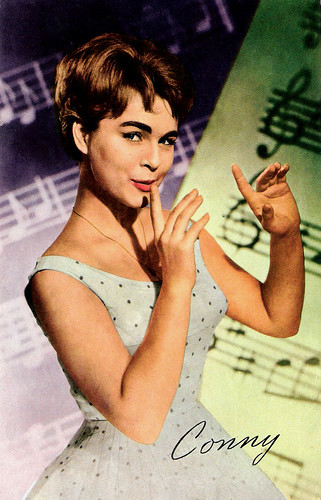
Dutch postcard by Uitg. 't Sticht, Utrecht, no. 116. Photo: Hafbofilm, Amsterdam.
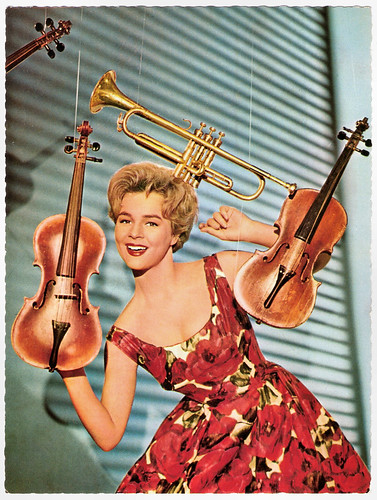
Big Dutch postcard by Gebr. Spanjersberg N.V., Rotterdam.
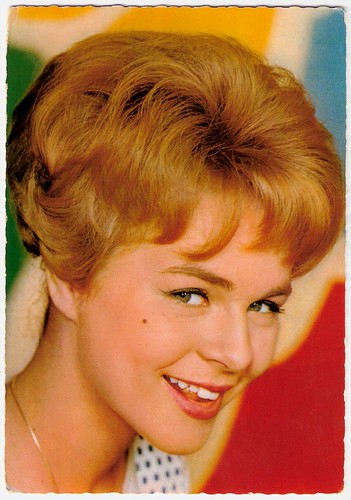
Dutch postcard by Gebr. Spanjersberg N.V., Rotterdam. Sent by mail in 1962.
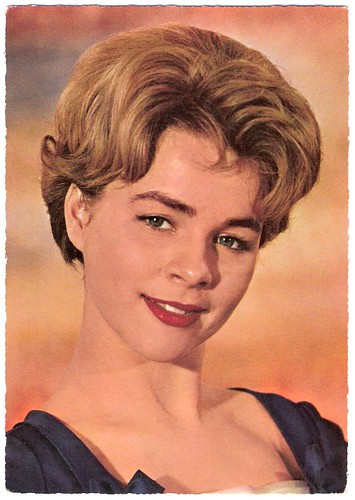
German postcard by Krüger, no. 902/72. Photo: Winkler / Sascha-Film / Constantin / Werner Press. Publicity card for Electrola.
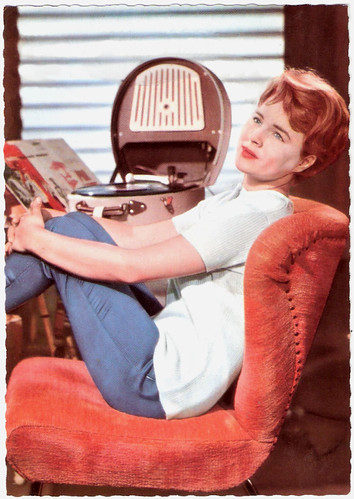
German postcard by Ufa, no. CK-298. Retail price: 30 Pfg. Photo: Arthur Grimm / UFA.
Cornelia 'Conny' Froboess was born in Wriezen a.d. Oder, in Brandenburg, eastern Germany, in 1943. Her mother Margaretha was sent there when her homeplace Berlin was bombed during the war.
Her father was the composer Gerhard Froboess. In 1951, his composition 'Pack die Badehose ein' (Pack Your Swimsuit, 1951) made his 7-year-old daughter Germany's first post-war child star.
'Pack die Badehose ein' is a cheery tune about a group of children going to swim at the Wannsee near Berlin on a hot summer's day. The song was originally composed for the Schöneberger Sängerknaben, but their manager refused the song. And so ‘Die kleine Cornelia’ (Little Cornelia) performed the song for the RIAS-radio show Mach mit live at the Berlin Titania-Palast. Her stage debut was a huge success.
The same year Die kleine Cornelia made her (uncredited) first film appearance in Sündige Grenze/Illegal Border (Robert A. Stemmle, 1951) with Dieter Borsche, about a band of juvenile smugglers. In the next years, many other films followed, such as Lass die Sonne Wieder Scheinen/Let the Sun Shine (Hubert Marischka, 1955) with Hans Holt.
She released more singles over the next couple of years. As she grew, 'Die kleine Cornelia' recorded as Conny and then as Conny Froboess.
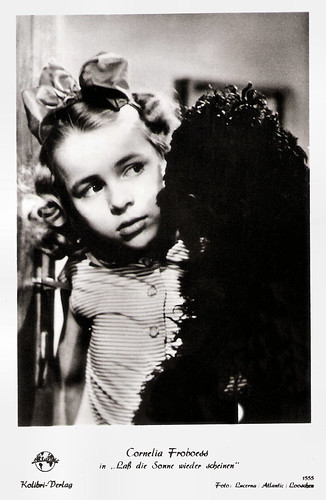
West-German postcard by Kolibri-Verlag, no. 1555. Photo: Lucerna / Atlantic / Looschen. Publicity still for Lass die Sonne wieder scheinen/Let the Sun Shine (Hubert Marischka, 1955).
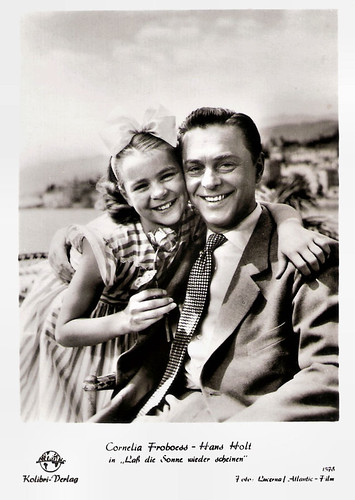
German postcard by Kolibri-Verlag, no. 1578. Photo: Lucerna / Atlantic-Film. Publicity still for Lass die Sonne Wieder Scheinen/Let the Sun Shine (Hubert Marischka, 1955) with Hans Holt.
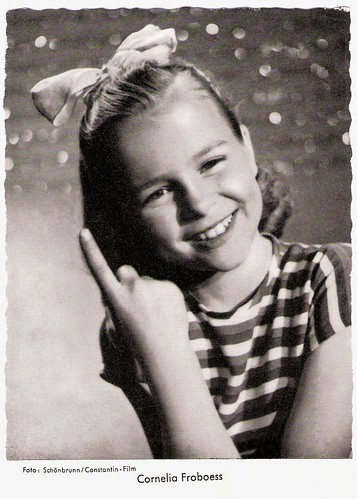
German postcard by WS-Druck, Wanne-Eickel. Photo: Schönbrunn / Constantin-Film.
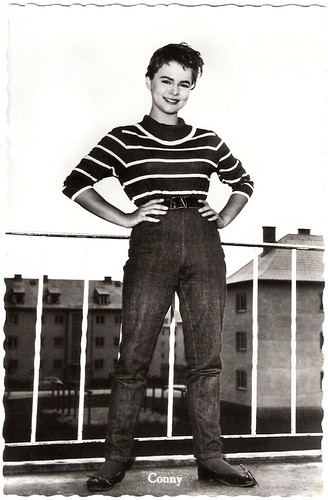
Dutch Postcard by N.V. v.h. Weenenk & Snel, Baarn, no. 1060.
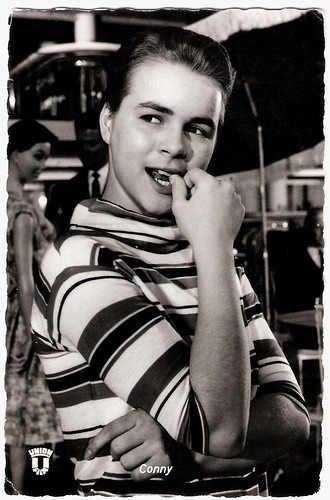
German postcard by Kolibri-Verlag G.m.b.H, Minden/Westf., no. 511. Photo: H.P. / Union / Ewald. Publicity still for Hula Hopp, Conny (Heinz Paul, 1959).
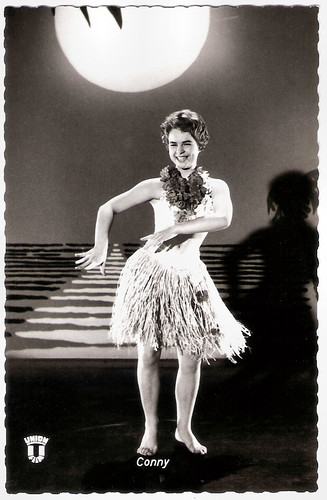
German postcard by Kolibri-Verlag G.m.b.H., Minden-Westf., no 557. Photo: H.P. / Union / Ewald. Publicity still for Hula-Hopp, Conny (Heinz Paul, 1959).
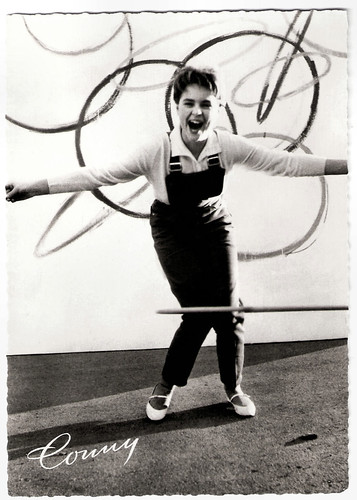
German postcard by Bartoschek-Verlag, Stuttgart Bad Canstatt, no. 1693. Photo: H.P.-Film / Union / Haenchen. Publicity still for Hula-Hopp, Conny (Heinz Paul, 1959).
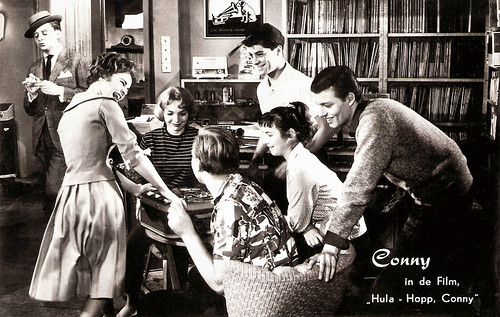
Dutch postcard. Photo: Publicity still for Hula-Hopp, Conny (Heinz Paul, 1959).
In 1958, after the Rock and Roll wave had hit Germany, Cornelia Froboess recorded Paul Anka’s 'Diana'. The song became #2 in the German hit parade and Cornelia became teen idol Conny. The name change signified a shift towards a more hip, Americanised image for the teenager.
Bruce Eder at AllMusic: "Froboess -- who was still a teenager and, thus, a natural fit for the new music -- began doing occasional rhythm numbers that incorporated a livelier, quasi-rock & roll beat into her music, roughly akin to what Connie Francis was doing in America and Petula Clark was doing in England and France at around the same time."
Other hits followed like 'I Love You Baby' (1958), 'Blue Jean Boy' (1958), and 'Lady Sunshine und Mister Moon' (1962). These hits cemented her position and saw the singer become an idol for German teens. Her star would rise even more with a string of popular Schlager films in which she performed her hits.
In Hula-Hopp, Conny (Heinz-Paul, 1959) with Rex Gildo, she performed songs like 'Holiday in Honolulu', 'Die Boys und Girls von heute' and of course 'Diana'. Gildo was also her co-star in Ja, so ein Mädchen mit sechzehn/Yeah, Such A Sixteen Year Old Girl (Hans Grimm, 1959) in which she sang the title song and also 'Little Girl' and 'Such das Glück des Lebens'.
Another frequent co-star was Peter Weck. They appeared together in such films as the remake Mariandl (Werner Jacobs, 1961). Probably the best of their films together was Der Traum von Lieschen Müller/The Dream of Lieschen Mueller (Helmut Kautner, 1961), in which Sonja Ziemann played the leading role.
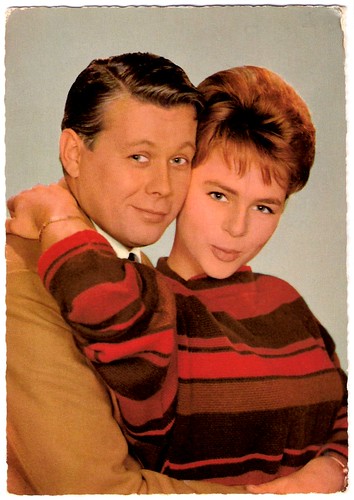
Dutch postcard. Sent by mail in 1964. Conny with Peter Weck.
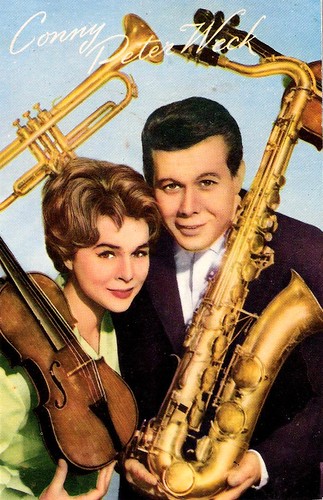
Dutch postcard. Conny with Peter Weck.

Dutch postcard by Uitgeverij Takken, Utrecht, no. AX 4899. Photo: Hafbo Film. Publicity still for Junge Leute brauchen Liebe/Young People Need Love (Géza von Cziffra, 1961) with Peter Weck.
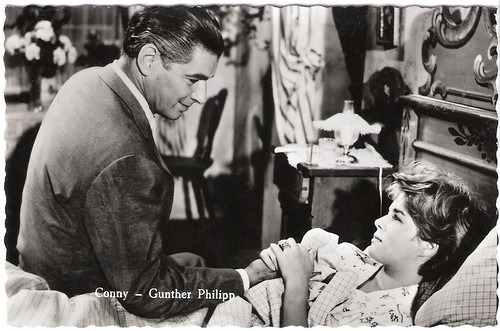
Dutch postcard by N.V. v.h. Weenenk & Snel, Baarn. Photo: publicity still for Mariandl (Werner Jacobs, 1961). The man on the postcard is not the mentioned Günther Philipp but Rudolf Prack.
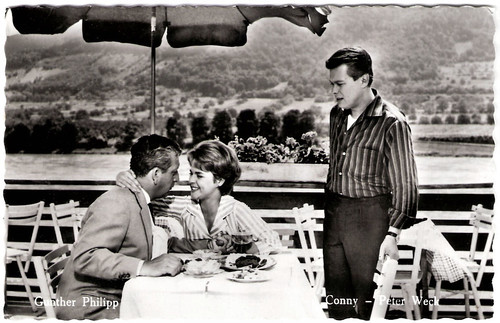
Dutch postcard by N.V. v.h. Weenenk & Snel, Baarn, no. 762. Photo: publicity still for Mariandl (Werner Jacobs, 1961) with Günther Philipp and Peter Weck.
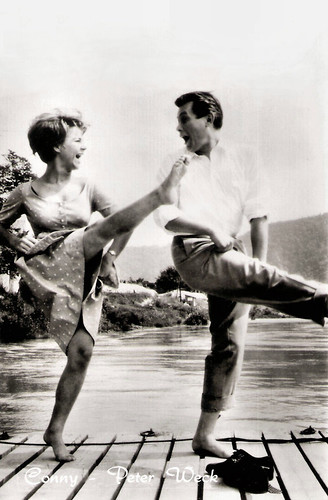
Dutch postcard by Int. Filmpers, Amsterdam, no. WPS 168. Photo: Centrafilm. Publicity still for Mariandl (Werner Jacobs, 1961) with Peter Weck.
In her films, Conny Froboess often portrayed a spontaneous 'Berliner Göre' (Brat from Berlin) who craves for independence from her strict parents.
Her comedy with 'the German Elvis', Peter Kraus, Wenn die Conny mit dem Peter/When Conny and Peter Do It Together (Fritz Umgelter, 1958), made them 'The dream couple of the German show world'.
Their Conny und Peter machen Musik/Conny and Peter Are Making Music (Werner Jacobs, 1960) was even the biggest box office hit of that year.
Jan Onderwater at IMDb: "Despite too simple story and so-so directing, a jolly and entertaining Schlager film, due to cast that makes the best of it, but it could have done with one or two Schlagers more (was Papa Froboess out of material?)."
Despite these commercial successes Conny and Peter only made these two Schlagerfilms together.
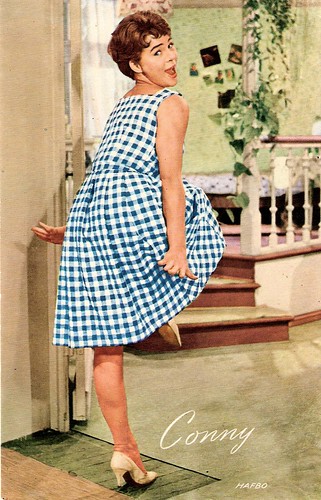
Dutch postcard. Photo: Hafbo. Publicity still for Ja, so ein Mädchen mit sechzehn/Yeah, Such A Sixteen Year Old Girl (Hans Grimm, 1959).
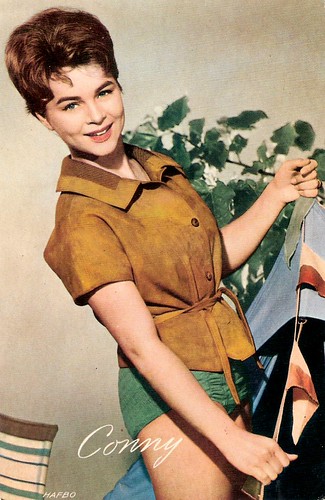
Dutch postcard by 't Sticht, Utrecht, no. 112. Photo: HAFBO. Publicity still from Conny und Peter machen Musik (Werner Jacobs, 1960).
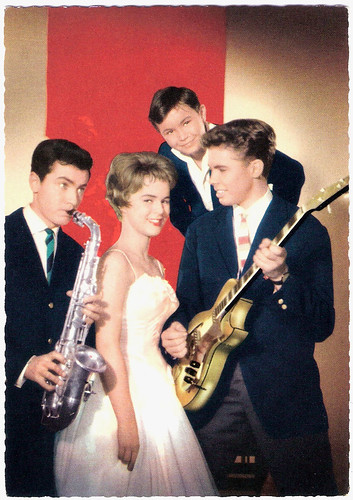
German postcard by ISV, no. E 13. Photo: Constantin / Grimm. Conny with Rex Gildo (left), Peter Krauss (right), and Rolf Pinegger.
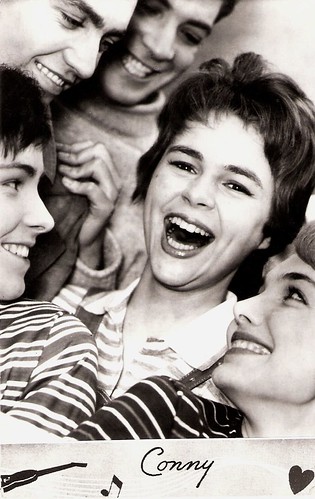
Vintage card, with far-left Rex Gildo.
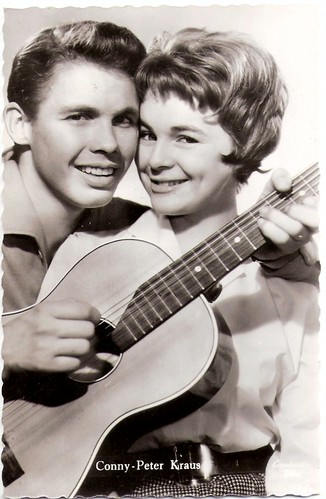
Dutch postcard, no. 761, with Peter Krauss.
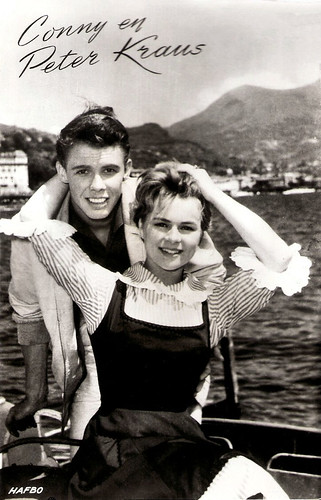
Dutch postcard by Uitg. Takken, Utrecht, no. AX 4489. Photo: Hafbo. Publicity still for Conny und Peter machen Musik (Werner Jacobs, 1960) with Peter Krauss.
In 1962 Conny Froboess' song 'Zwei kleine Italiener' (Two Little Italians) was Germany's entry at The Eurovision Song Contest. At the 1962 Deutsche Schlager-Festpielen, the German preliminaries, she had narrowly beaten Swedish singer Siw Malmkvist into second place. In Luxembourg at the pan-European final, Conny finished disappointingly sixth but the song became her only no. 1 hit in Germany. It stayed there for five weeks and was awarded a gold disc. Conny also recorded the song in Dutch, English and Italian. 'Zwei kleine Italiener' – penned by Christian Bruhn and Georg Buschor – went on to sell over a million copies internationally and is considered an evergreen of German pop.
That same year she appeared in Jean Renoir's war comedy Le caporal épinglé/The Elusive Corporal (1962), starring Jean-Pierre Cassel as a corporal who during WWII tries to escape from German prison camps, sometimes making it a few yards, sometimes reaching the French border. Her role in the film was small, but the film was prestigious.
In the mid-1960s, she branched out from Schlager films to doing filmed operetta, including a version of Carl Zeller's Der Vogelhändler/The Bird Seller (Géza von Cziffra, 1962) with Peter Weck. Jan Onderwater at IMDb: "The plot of the operetta was changed to fit into 90 minutes, but maybe also for the original being unacceptably corny; but it is all to no avail. Von Cziffra directed without imagination and spirit and he is hopelessly inadequate in using the Ultrascope format. The result is a dull film."
She also made two comedies with Peter Alexander, Der Musterknabe/The Model Boy (Werner Jacobs, 1963) and Hilfe, meine Braut klaut/Help, My Bride Steals (Werner Jacobs, 1964) in which she played a kleptomaniac. The Beatles now topped the charts and Conny Froboess had lost her interest in music. She had been taking acting lessons since the late 1950s, and she decided to focus on acting.
Public and critical acclaim for her role in the TV film Wahn oder der Teufel in Boston/Delusion or the Devil in Boston (Gerhard Klingenberg, 1965), based on a play by Lion Feuchtwanger, proved decisive. German magazine HörZu wrote surprised: "Television has won a young talented actress. Fraulein Froboess will probably have to decide now - for Conny or Cornelia." From then on, she would strive to become a respected stage and TV actress and she would go on to portray the heroines of several classic plays. Credited as Cornelia Froboess...
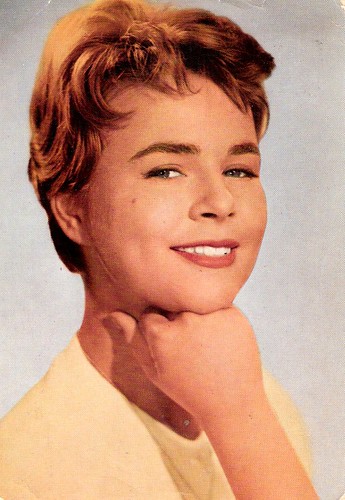
German postcard by ISV, no. H 48.
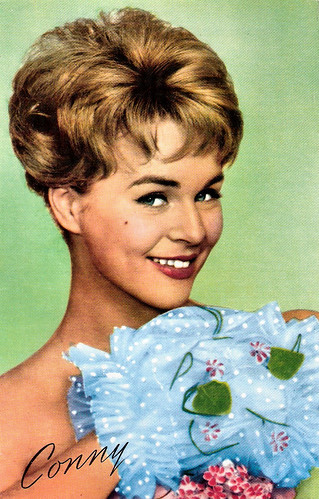
Dutch postcard by 't Sticht, Utrecht, Maxicolor no. 126. Photo: Hafbo. Publicity still for Junge Leute brauchen Liebe/Young People Need Love (Géza von Cziffra, 1961).
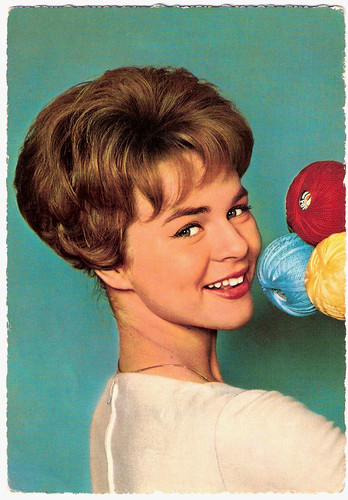
German postcard by Krüger, no. 902/97. Photo: Bavariafilm.
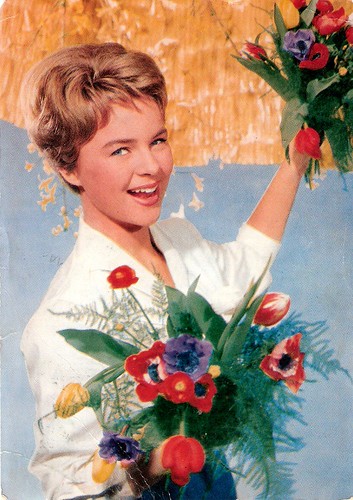
Dutch postcard by Gebr. Spanjersberg N.V., Rotterdam, no. CK 365. Ca. 1962. Photo: Ufa, Berlin.
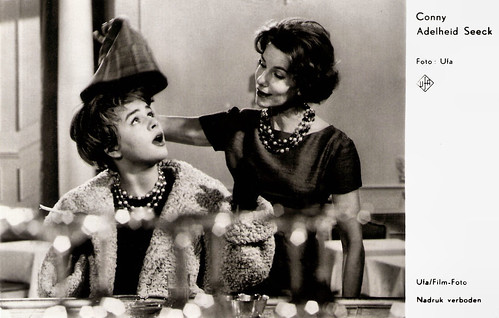
Dutch postcard. Photo: Ufa. Publicity still for Mein Mann, das Wirtschaftswunder/My husband, the economic miracle (Ulrich Erfurth, 1961) with Adelheid Seeck.
From 1972 to 2001 Cornelia Froboess was a permanent ensemble member at the renowned Kammerspiele in Munich and since 2001 at the Bayerisches Staatsschauspiel. A hugely popular success was her role as Eliza Doolittle in the stage musical 'My Fair Lady' at Munich’s Theater am Gärtnerplatz. Froboess also worked regularly for television, but she made only a few more feature films. With director Kurt Hoffmann, she made the romantic comedy Rheinsberg (1967), based on a novel by Kurt Tucholsky. She won the Ernst Lubitsch prize for her role, and in 1968 she won a Golden Camera for the title role in the film Mathilde Möhring (Claus Peter Witt, 1968), based on a play by Theodor Fontane. A complete failure was her comedy with showmaster Rudi Carrell, Crazy - total verrückt (Franz Josef Gottlieb, 1973)
Remarkable was her role in Rainer Werner Fassbinder’s excellent drama Die Sehnsucht der Veronika Voss/Veronika Voss (1982). It was the third and last film in the trilogy that included Die Ehe der Maria Braun/The Marriage of Maria Braun (Rainer Werner Fassbinder, 1979) and Lola (Rainer Werner Fassbinder, 1981) and was one of the last films Fassbinder made before his sudden death. Froboess played Henriette, the girlfriend of a sports journalist (Hilmar Thate) who by chance meets mysterious, former Ufa star Veronika Voss (Rosel Zech) and becomes intrigued by her. Henriette is curious about what will happen between them.
On stage, she played Marthe Schwerdtlein in Johann Wolfgang von Goethe's 'Faust I' (1988), a performance that was also released as a film: Faust – Vom Himmel durch die Welt zur Hölle/Faust - the film (Dieter Dorn, 1988) starring Helmut Griem. On stage, she appeared in Gotthold Ephraim Lessing's 'Minna von Barnhelm' in 1976 and played Ellida in Henrik Ibsen's 'The Lady from the Sea' in 1990. At the Salzburg Festival 2004, she played Mary Tyrone in Eugene O'Neill's 'Long Day's Journey into Night'. The same year she played the title role in Bertolt Brecht's play 'Mutter Courage und ihre Kinder' (Mother Courage and Her Children).
In the film Knockin' on Heaven's Door (Thomas Jahn, 1997), she played the mother of a man suffering from terminal cancer, played by Til Schweiger. The film was an unexpected smash hit. Later film appearances include a role as a grandmother in Villa Henriette (Peter Payer, 2004), the family film Ostwind/Windstorm (Katja von Garnier, 2013) and its sequels Ostwind 2/Windstorm (Katja von Garnier, 2015), Ostwind 3: Aufbruch nach Ora/Windstorm 3: Windstorm and the Wild Horses (Katja von Garnier, 2017), Ostwind – Aris Ankunft/Windstorm 4: Ari's Arrival (Theresa von Eltz, 2019) and Ostwind – Der große Orkan/Windstorm: The Great Hurricane (Lea Schmidbauer, 2021).
She also appears regularly on TV as a guest star in such popular Krimi series as SOKO 5113 (2009), Der Alte/The Old Fox (1980-2010) and Tatort/Crime Scene (2000-2016). Then followed the TV comedy Ein Lächeln nachts um vier/A Smile at Four at Night (Jan Ruzicka, 2018) with August Wittgenstein and Tilo Prückner. In 2021, Conny Froboess received a Lifetime Achievement Award at the Romy Awards in Austria and the German Screen Award for her contribution to the world of acting. Since 1967 Cornelia Froboess was married to Austrian theatre director and manager Hellmuth Matiasek. He died in 2022. They had two children, Agnes (1968) and Kaspar (1970).
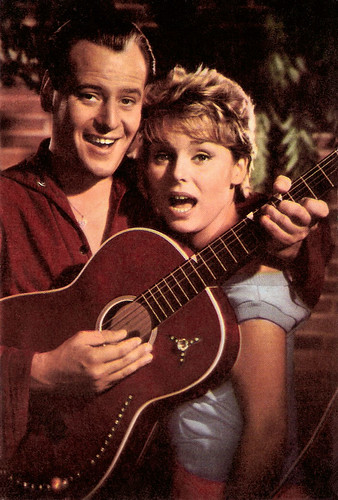
Belgian postcard by Cox, no. 25. With Fred Bertelmann. Photo: probably a publicity still for Wenn das mein großer Bruder wüßte/When my big brother knew that (Erik Ode, 1959)
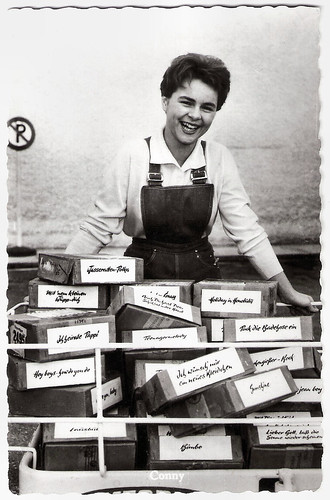
Dutch postcard.
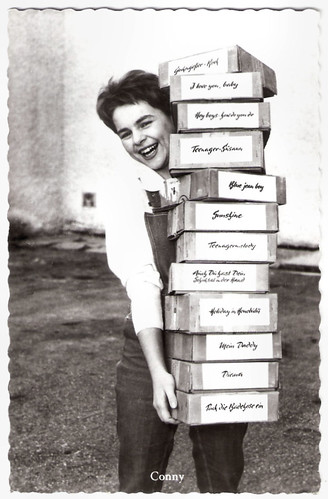
Dutch postcard by N.V. v.h. Weenenk & Snel, Baarn. Sent by mail in 1961.
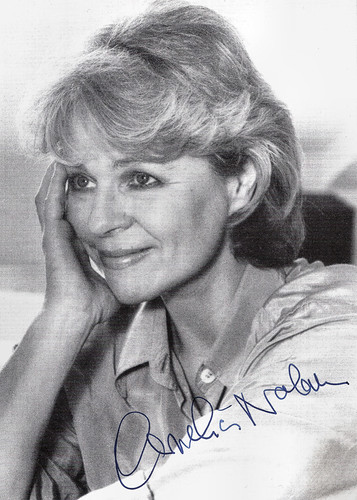
German promotion card by Electrola. Photo: Studio Berneis, München.
Cornelia Froboess sings 'Diana' in Hula-Hopp, Conny (Heinz Paul, 1959). Source: Liebhaberaltermusik (YouTube).
Conny Froboess sings 'Wo ist der Mann?' in Der Traum von Lieschen Müller/The Dream of Lieschen Muelle (Helmut Kautner, 1961). Source: scaasifun (YouTube).
Sources: Jan Onderwater (IMDb), Bruce Eder (AllMusic), Filmportal.de, Ready steady girls, Die Krimi Home Page (German), IMDb and Wikipedia.
This post was last updated on 17 April 2024.

Dutch postcard by Uitg. 't Sticht, Utrecht, no. 116. Photo: Hafbofilm, Amsterdam.

Big Dutch postcard by Gebr. Spanjersberg N.V., Rotterdam.

Dutch postcard by Gebr. Spanjersberg N.V., Rotterdam. Sent by mail in 1962.

German postcard by Krüger, no. 902/72. Photo: Winkler / Sascha-Film / Constantin / Werner Press. Publicity card for Electrola.

German postcard by Ufa, no. CK-298. Retail price: 30 Pfg. Photo: Arthur Grimm / UFA.
Germany's first post-war child star
Cornelia 'Conny' Froboess was born in Wriezen a.d. Oder, in Brandenburg, eastern Germany, in 1943. Her mother Margaretha was sent there when her homeplace Berlin was bombed during the war.
Her father was the composer Gerhard Froboess. In 1951, his composition 'Pack die Badehose ein' (Pack Your Swimsuit, 1951) made his 7-year-old daughter Germany's first post-war child star.
'Pack die Badehose ein' is a cheery tune about a group of children going to swim at the Wannsee near Berlin on a hot summer's day. The song was originally composed for the Schöneberger Sängerknaben, but their manager refused the song. And so ‘Die kleine Cornelia’ (Little Cornelia) performed the song for the RIAS-radio show Mach mit live at the Berlin Titania-Palast. Her stage debut was a huge success.
The same year Die kleine Cornelia made her (uncredited) first film appearance in Sündige Grenze/Illegal Border (Robert A. Stemmle, 1951) with Dieter Borsche, about a band of juvenile smugglers. In the next years, many other films followed, such as Lass die Sonne Wieder Scheinen/Let the Sun Shine (Hubert Marischka, 1955) with Hans Holt.
She released more singles over the next couple of years. As she grew, 'Die kleine Cornelia' recorded as Conny and then as Conny Froboess.

West-German postcard by Kolibri-Verlag, no. 1555. Photo: Lucerna / Atlantic / Looschen. Publicity still for Lass die Sonne wieder scheinen/Let the Sun Shine (Hubert Marischka, 1955).

German postcard by Kolibri-Verlag, no. 1578. Photo: Lucerna / Atlantic-Film. Publicity still for Lass die Sonne Wieder Scheinen/Let the Sun Shine (Hubert Marischka, 1955) with Hans Holt.

German postcard by WS-Druck, Wanne-Eickel. Photo: Schönbrunn / Constantin-Film.

Dutch Postcard by N.V. v.h. Weenenk & Snel, Baarn, no. 1060.

German postcard by Kolibri-Verlag G.m.b.H, Minden/Westf., no. 511. Photo: H.P. / Union / Ewald. Publicity still for Hula Hopp, Conny (Heinz Paul, 1959).

German postcard by Kolibri-Verlag G.m.b.H., Minden-Westf., no 557. Photo: H.P. / Union / Ewald. Publicity still for Hula-Hopp, Conny (Heinz Paul, 1959).

German postcard by Bartoschek-Verlag, Stuttgart Bad Canstatt, no. 1693. Photo: H.P.-Film / Union / Haenchen. Publicity still for Hula-Hopp, Conny (Heinz Paul, 1959).

Dutch postcard. Photo: Publicity still for Hula-Hopp, Conny (Heinz Paul, 1959).
Teen idol
In 1958, after the Rock and Roll wave had hit Germany, Cornelia Froboess recorded Paul Anka’s 'Diana'. The song became #2 in the German hit parade and Cornelia became teen idol Conny. The name change signified a shift towards a more hip, Americanised image for the teenager.
Bruce Eder at AllMusic: "Froboess -- who was still a teenager and, thus, a natural fit for the new music -- began doing occasional rhythm numbers that incorporated a livelier, quasi-rock & roll beat into her music, roughly akin to what Connie Francis was doing in America and Petula Clark was doing in England and France at around the same time."
Other hits followed like 'I Love You Baby' (1958), 'Blue Jean Boy' (1958), and 'Lady Sunshine und Mister Moon' (1962). These hits cemented her position and saw the singer become an idol for German teens. Her star would rise even more with a string of popular Schlager films in which she performed her hits.
In Hula-Hopp, Conny (Heinz-Paul, 1959) with Rex Gildo, she performed songs like 'Holiday in Honolulu', 'Die Boys und Girls von heute' and of course 'Diana'. Gildo was also her co-star in Ja, so ein Mädchen mit sechzehn/Yeah, Such A Sixteen Year Old Girl (Hans Grimm, 1959) in which she sang the title song and also 'Little Girl' and 'Such das Glück des Lebens'.
Another frequent co-star was Peter Weck. They appeared together in such films as the remake Mariandl (Werner Jacobs, 1961). Probably the best of their films together was Der Traum von Lieschen Müller/The Dream of Lieschen Mueller (Helmut Kautner, 1961), in which Sonja Ziemann played the leading role.

Dutch postcard. Sent by mail in 1964. Conny with Peter Weck.

Dutch postcard. Conny with Peter Weck.

Dutch postcard by Uitgeverij Takken, Utrecht, no. AX 4899. Photo: Hafbo Film. Publicity still for Junge Leute brauchen Liebe/Young People Need Love (Géza von Cziffra, 1961) with Peter Weck.

Dutch postcard by N.V. v.h. Weenenk & Snel, Baarn. Photo: publicity still for Mariandl (Werner Jacobs, 1961). The man on the postcard is not the mentioned Günther Philipp but Rudolf Prack.

Dutch postcard by N.V. v.h. Weenenk & Snel, Baarn, no. 762. Photo: publicity still for Mariandl (Werner Jacobs, 1961) with Günther Philipp and Peter Weck.

Dutch postcard by Int. Filmpers, Amsterdam, no. WPS 168. Photo: Centrafilm. Publicity still for Mariandl (Werner Jacobs, 1961) with Peter Weck.
When Conny and Peter do it together
In her films, Conny Froboess often portrayed a spontaneous 'Berliner Göre' (Brat from Berlin) who craves for independence from her strict parents.
Her comedy with 'the German Elvis', Peter Kraus, Wenn die Conny mit dem Peter/When Conny and Peter Do It Together (Fritz Umgelter, 1958), made them 'The dream couple of the German show world'.
Their Conny und Peter machen Musik/Conny and Peter Are Making Music (Werner Jacobs, 1960) was even the biggest box office hit of that year.
Jan Onderwater at IMDb: "Despite too simple story and so-so directing, a jolly and entertaining Schlager film, due to cast that makes the best of it, but it could have done with one or two Schlagers more (was Papa Froboess out of material?)."
Despite these commercial successes Conny and Peter only made these two Schlagerfilms together.

Dutch postcard. Photo: Hafbo. Publicity still for Ja, so ein Mädchen mit sechzehn/Yeah, Such A Sixteen Year Old Girl (Hans Grimm, 1959).

Dutch postcard by 't Sticht, Utrecht, no. 112. Photo: HAFBO. Publicity still from Conny und Peter machen Musik (Werner Jacobs, 1960).

German postcard by ISV, no. E 13. Photo: Constantin / Grimm. Conny with Rex Gildo (left), Peter Krauss (right), and Rolf Pinegger.

Vintage card, with far-left Rex Gildo.

Dutch postcard, no. 761, with Peter Krauss.

Dutch postcard by Uitg. Takken, Utrecht, no. AX 4489. Photo: Hafbo. Publicity still for Conny und Peter machen Musik (Werner Jacobs, 1960) with Peter Krauss.
The Eurovision Song Contest
In 1962 Conny Froboess' song 'Zwei kleine Italiener' (Two Little Italians) was Germany's entry at The Eurovision Song Contest. At the 1962 Deutsche Schlager-Festpielen, the German preliminaries, she had narrowly beaten Swedish singer Siw Malmkvist into second place. In Luxembourg at the pan-European final, Conny finished disappointingly sixth but the song became her only no. 1 hit in Germany. It stayed there for five weeks and was awarded a gold disc. Conny also recorded the song in Dutch, English and Italian. 'Zwei kleine Italiener' – penned by Christian Bruhn and Georg Buschor – went on to sell over a million copies internationally and is considered an evergreen of German pop.
That same year she appeared in Jean Renoir's war comedy Le caporal épinglé/The Elusive Corporal (1962), starring Jean-Pierre Cassel as a corporal who during WWII tries to escape from German prison camps, sometimes making it a few yards, sometimes reaching the French border. Her role in the film was small, but the film was prestigious.
In the mid-1960s, she branched out from Schlager films to doing filmed operetta, including a version of Carl Zeller's Der Vogelhändler/The Bird Seller (Géza von Cziffra, 1962) with Peter Weck. Jan Onderwater at IMDb: "The plot of the operetta was changed to fit into 90 minutes, but maybe also for the original being unacceptably corny; but it is all to no avail. Von Cziffra directed without imagination and spirit and he is hopelessly inadequate in using the Ultrascope format. The result is a dull film."
She also made two comedies with Peter Alexander, Der Musterknabe/The Model Boy (Werner Jacobs, 1963) and Hilfe, meine Braut klaut/Help, My Bride Steals (Werner Jacobs, 1964) in which she played a kleptomaniac. The Beatles now topped the charts and Conny Froboess had lost her interest in music. She had been taking acting lessons since the late 1950s, and she decided to focus on acting.
Public and critical acclaim for her role in the TV film Wahn oder der Teufel in Boston/Delusion or the Devil in Boston (Gerhard Klingenberg, 1965), based on a play by Lion Feuchtwanger, proved decisive. German magazine HörZu wrote surprised: "Television has won a young talented actress. Fraulein Froboess will probably have to decide now - for Conny or Cornelia." From then on, she would strive to become a respected stage and TV actress and she would go on to portray the heroines of several classic plays. Credited as Cornelia Froboess...

German postcard by ISV, no. H 48.

Dutch postcard by 't Sticht, Utrecht, Maxicolor no. 126. Photo: Hafbo. Publicity still for Junge Leute brauchen Liebe/Young People Need Love (Géza von Cziffra, 1961).

German postcard by Krüger, no. 902/97. Photo: Bavariafilm.

Dutch postcard by Gebr. Spanjersberg N.V., Rotterdam, no. CK 365. Ca. 1962. Photo: Ufa, Berlin.

Dutch postcard. Photo: Ufa. Publicity still for Mein Mann, das Wirtschaftswunder/My husband, the economic miracle (Ulrich Erfurth, 1961) with Adelheid Seeck.
Rainer Werner Fassbinder
From 1972 to 2001 Cornelia Froboess was a permanent ensemble member at the renowned Kammerspiele in Munich and since 2001 at the Bayerisches Staatsschauspiel. A hugely popular success was her role as Eliza Doolittle in the stage musical 'My Fair Lady' at Munich’s Theater am Gärtnerplatz. Froboess also worked regularly for television, but she made only a few more feature films. With director Kurt Hoffmann, she made the romantic comedy Rheinsberg (1967), based on a novel by Kurt Tucholsky. She won the Ernst Lubitsch prize for her role, and in 1968 she won a Golden Camera for the title role in the film Mathilde Möhring (Claus Peter Witt, 1968), based on a play by Theodor Fontane. A complete failure was her comedy with showmaster Rudi Carrell, Crazy - total verrückt (Franz Josef Gottlieb, 1973)
Remarkable was her role in Rainer Werner Fassbinder’s excellent drama Die Sehnsucht der Veronika Voss/Veronika Voss (1982). It was the third and last film in the trilogy that included Die Ehe der Maria Braun/The Marriage of Maria Braun (Rainer Werner Fassbinder, 1979) and Lola (Rainer Werner Fassbinder, 1981) and was one of the last films Fassbinder made before his sudden death. Froboess played Henriette, the girlfriend of a sports journalist (Hilmar Thate) who by chance meets mysterious, former Ufa star Veronika Voss (Rosel Zech) and becomes intrigued by her. Henriette is curious about what will happen between them.
On stage, she played Marthe Schwerdtlein in Johann Wolfgang von Goethe's 'Faust I' (1988), a performance that was also released as a film: Faust – Vom Himmel durch die Welt zur Hölle/Faust - the film (Dieter Dorn, 1988) starring Helmut Griem. On stage, she appeared in Gotthold Ephraim Lessing's 'Minna von Barnhelm' in 1976 and played Ellida in Henrik Ibsen's 'The Lady from the Sea' in 1990. At the Salzburg Festival 2004, she played Mary Tyrone in Eugene O'Neill's 'Long Day's Journey into Night'. The same year she played the title role in Bertolt Brecht's play 'Mutter Courage und ihre Kinder' (Mother Courage and Her Children).
In the film Knockin' on Heaven's Door (Thomas Jahn, 1997), she played the mother of a man suffering from terminal cancer, played by Til Schweiger. The film was an unexpected smash hit. Later film appearances include a role as a grandmother in Villa Henriette (Peter Payer, 2004), the family film Ostwind/Windstorm (Katja von Garnier, 2013) and its sequels Ostwind 2/Windstorm (Katja von Garnier, 2015), Ostwind 3: Aufbruch nach Ora/Windstorm 3: Windstorm and the Wild Horses (Katja von Garnier, 2017), Ostwind – Aris Ankunft/Windstorm 4: Ari's Arrival (Theresa von Eltz, 2019) and Ostwind – Der große Orkan/Windstorm: The Great Hurricane (Lea Schmidbauer, 2021).
She also appears regularly on TV as a guest star in such popular Krimi series as SOKO 5113 (2009), Der Alte/The Old Fox (1980-2010) and Tatort/Crime Scene (2000-2016). Then followed the TV comedy Ein Lächeln nachts um vier/A Smile at Four at Night (Jan Ruzicka, 2018) with August Wittgenstein and Tilo Prückner. In 2021, Conny Froboess received a Lifetime Achievement Award at the Romy Awards in Austria and the German Screen Award for her contribution to the world of acting. Since 1967 Cornelia Froboess was married to Austrian theatre director and manager Hellmuth Matiasek. He died in 2022. They had two children, Agnes (1968) and Kaspar (1970).

Belgian postcard by Cox, no. 25. With Fred Bertelmann. Photo: probably a publicity still for Wenn das mein großer Bruder wüßte/When my big brother knew that (Erik Ode, 1959)

Dutch postcard.

Dutch postcard by N.V. v.h. Weenenk & Snel, Baarn. Sent by mail in 1961.

German promotion card by Electrola. Photo: Studio Berneis, München.
Cornelia Froboess sings 'Diana' in Hula-Hopp, Conny (Heinz Paul, 1959). Source: Liebhaberaltermusik (YouTube).
Conny Froboess sings 'Wo ist der Mann?' in Der Traum von Lieschen Müller/The Dream of Lieschen Muelle (Helmut Kautner, 1961). Source: scaasifun (YouTube).
Sources: Jan Onderwater (IMDb), Bruce Eder (AllMusic), Filmportal.de, Ready steady girls, Die Krimi Home Page (German), IMDb and Wikipedia.
This post was last updated on 17 April 2024.
1 comment:
Wundebar!!!
Post a Comment